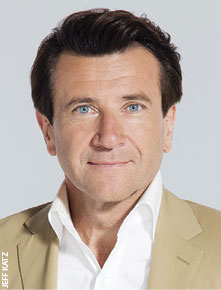 Investor: Robert Herjavec
Investor: Robert Herjavec
Shark Tank Appearance: Feb. 24, 2017
Deal: $200,000 for a 15 percent stake
Results: Sales increased from $1.6 million to $2.7 million in four months.
For three millennials and best friends, the journey to launching a multimillion-dollar beach lifestyle company began in a San Diego call center where they sold life insurance. There, in 2013, college roommates Steven Ford and Brandon Leibel met fellow insurance hawker Bruno Aschidamini.
Four years later, the trio appeared on Shark Tank, the ABC business reality show, and they received offers from Mark Cuban, Kevin O’Leary and Robert Herjavec for their beach towel business Sand Cloud. Today, with Herjavec as their investor and mentor, the buddies are on track to bring in $7 million in sales by the end of the year.
Leibel shares his thoughts on how the friends were able to pull off their business.
Related: 5 Ways to Make Your Business Better Than the Competition
They went all in.
By 2014 all three had quit their jobs to focus on building Sand Cloud together. To save on rent money, Aschidamini gave up his apartment and slept on the floor of the two-bedroom loft Ford and Leibel shared. They ate rice and beans for a year. They sold almost all of their furniture. Aschidamini and Ford sold their cars. Leibel kept his so he could work as an Uber driver. They borrowed money from their families and maxed out their credit cards. “We never thought about failure,” Leibel says. “We never worried. We operated on blind faith, and we were young enough that we could afford to take this big risk.”
They persisted.
“Our job in the call center taught us to deal with rejection,” Leibel says. “We’d each make 300 to 500 calls a day, and 95 percent of the people we reached told us to take them off of the list.” So when they started walking the beach and introducing their towels to sunbathers, the guys didn’t flinch when they faced blank stares.
They stayed hopeful.
For the first couple of years, the partners barely paid attention to how many towels they were selling—or rather, weren’t selling. Instead they focused on building a social media following. “Our mission was to gain 100 followers a day,” Leibel says. “To keep motivated, we’d have contests among the three of us on who could gain the most followers.” They sent out their Turkish beach towels to influencers, and they handed out business cards wherever they went with a picture of the towels and their social media handles. Leibel wooed his Uber passengers to like Sand Cloud on Facebook and follow the company on Instagram.
Related: 9 Entrepreneurial Lessons You Never Learned in School
They were able to pivot.
The original idea Ford and Leibel had was for a beach towel with a built-in pillow for easy napping in the sand. In January 2015, the guys took their pillow-towel to the Surf Expo trade show in Orlando, Florida. Buyers at the show kept commenting on a sample towel with a blue mandala pattern that they’d stashed in the corner of their booth. The surf-wear company Quiksilver ordered 400 mandala towels for its retail stores. Meanwhile, the pillow-towels were proving to be a snooze. As sales of decorated towels surged and the pillow-towel continued to tank, they made the decision to focus exclusively on pillow-less towels.
They had a mission.
From the beginning, the guys shared the vision of becoming the TOMS of beach products, striving for the social impact of the storied buy-one-donate-one shoe company. Sand Cloud donates 10 percent of its profits to organizations that support marine life and clean oceans, including the Marine Conservation Institute and the Surfrider Foundation. “We always looked up to TOMS,” Leibel says. “We’re passionate about protecting our oceans. Participating in activities like releasing rehabilitated sea lions back into the ocean or taking part in beach cleanups has changed the three of us personally. One small example is we never walk the beach without picking up trash.”
“We never worried. We operated on blind faith, and we were young enough that we could afford to take this big risk.”
They market test religiously.
“We vet everything, whether it’s a new product or a new pattern for a towel, through our prospective customers,” Leibel says. Sand Cloud will soon start selling yoga towels. The thousands of positive votes they received when they posted mock-ups of the towels on social media convinced them there was a receptive market for this new product category.
One thing the trio didn’t market test is the decision to remain primarily an e-commerce company. Although Sand Cloud towels are sold in a hundred or so boutiques across the country, 95 percent of sales are generated from its website, and the partners have no interest in opening brick-and-mortar stores. “Robert Herjavec, who has a lot of wisdom and experience, has had a lot of success with online retailers,” Leibel says. “He validated that online is the way for us to go. That’s all we needed to hear.”
Related: 5 Tips for Entrepreneurial Success
This article originally appeared in the October 2017 issue of SUCCESS magazine.




